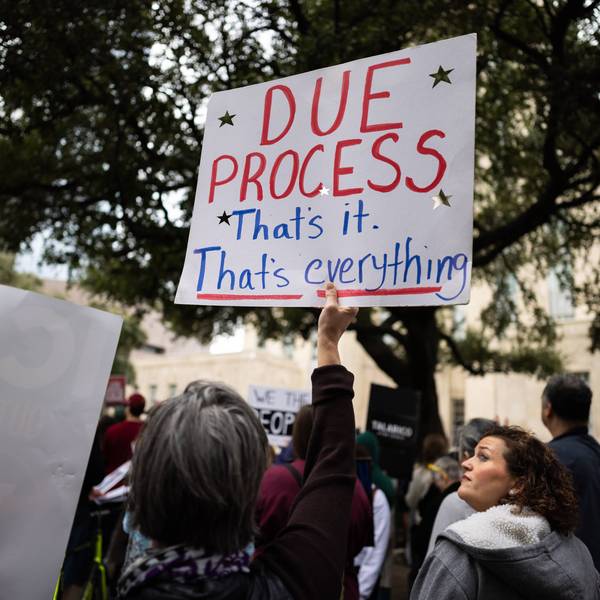When the Trump administration began cracking down on family sponsors for young immigrants earlier this year, immigrant rights advocates correctly predicted the new policies would result in fewer families coming forward to claim young people in detention centers--and that trend is having far-reaching effects on immigrants as they age out of children's facilities.
With fewer sponsors coming forward, children's detention facilities are holding more than 12,000 young immigrants--more than five times the number of children in federal custody in the spring of 2017--and upon turning 18, a record number of detainees are now being transferred directly to adult facilities.
"Turning 18 is sort of a coming-of-age ritual," Holly Cooper, co-director of the immigration law clinic at The University of California, Davis, told the Huffington Post, which reported on the transfers. "But for these children, it's 'Happy Birthday, we're sending you to prison.' It's just a very inhumane process that's happening."
"This is just another form of family separation. You are transferred in handcuffs to a facility that's a prison and there's no one in your peer group, no relatives, and no family who you can relate to. It's just continuing trauma with no real respite." --Lisa Lehner, Americans For Immigrant Justice
Immigration and Customs Enforcement (ICE) announced earlier this year that every member of a household offering to sponsor a young immigrant would be forced to undergo a background check involving fingerprinting. The regulation has caused fewer families to come forward, as has caused widespread fear in Latino communities that ICE will target families for deportation if they attempt to retrieve their young relatives from detention.
The fingerprinting requirement has also caused a backlog, with the government failing to process background checks for many families in time for young immigrants' 18th birthdays, forcing them to be sent to adult facilities. Such transfers violate the Flores settlement, critics say, which states that children of detained undocumented immigrants must be held in the "least restrictive setting available."
One young immigrant turned 18 in September, four months after his uncle had applied to sponsor him. On his birthday, he was shackled and driven to a detention center housing 600 adult males.
"It's ridiculous for it to take 100 days for someone's fingerprints to run," Lisa Lehner, an attorney who worked on the young man's case at Americans For Immigrant Justice (AIJ), told the Huffington Post. "It's unconscionable that ICE is violating clear federal law and taking [teenagers] to the most restrictive setting as opposed to the least restrictive setting."
Immigrant rights advocates argue that transferring young people who have committed no crime to adult facilities prolongs and intensifies the trauma many have experienced after fleeing violence and then being held in U.S. custody for weeks or months at a time.
"This is just another form of family separation. You are transferred in handcuffs to a facility that's a prison and there's no one in your peer group, no relatives, and no family who you can relate to," Lehner told the Huffington Post. "It's just continuing trauma with no real respite."
In August, the U.S. District Court in Washington, D.C. allowed a case regarding the practice to proceed and rejected the government's motion top dismiss the case.
"The court's decision recognizes that there are real, tangible, systemic problems with how ICE detains 18-year-olds transferred from federal children's shelters," said Kate Melloy Goettel, senior litigation attorney at the National Immigrant Justice Center (NIJC), which filed the class-action lawsuit. "Teens who flee their home countries alone to seek safety here need our protection and support, but instead the U.S. government locks them up on their 18th birthdays."




